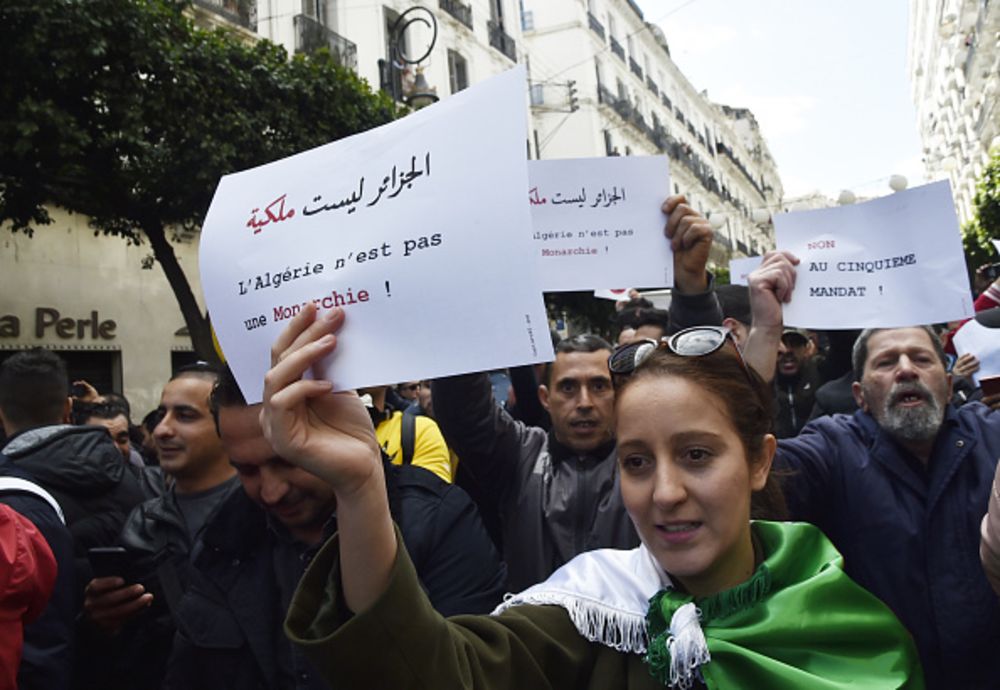Politics & Policy
By Bobby Ghosh
A restive young population wants jobs and generational change.
What happens to a dream deferred? Photographer: Ryad Kramdi/AFP/Getty Images
When the Arab Spring rolled across North Africa in 2011, it seemed almost to skip over Algeria. Although the country was ripe for revolution — like its neighbors, it had the combustible combination of chronic youth unemployment and corrupt, repressive leadership — the protests there were almost desultory in comparison with demonstrations in Tunisia and Egypt.
As a result, President Abdelaziz Bouteflika did not suffer the fate of his fellow autocrats in Tunis and Cairo. Whereas Islamist parties won elections in Egypt and Morocco, Bouteflika’s National Liberation Front remained entrenched, backed by his traditional allies in the military and the intelligence services.
Why? The Algerian exception was explained variously as the result of Bouteflika’s adroit use of generous subsidies to tamp down economic anxieties, and a national horror of revolutionary change — the brutal civil war of the 1990s, which killed tens of thousands, was still fresh in people’s memories.
Memories fade, however, and government handouts lose their value with time. Eight years after the Arab Spring, some Algerians may be ready for another revolution. Protests have broken out since the announcement that Bouteflika will seek a fifth term in office in the elections due in April. The president is 81, and has rarely been seen in public since a stroke six years ago.
But the latest demonstrations differ from those of 2011. During the Arab Spring, protesters across the region were demanding a wholesale change in government. From Tunisia and Egypt to Yemen and Syria, the slogan echoing in the streets was “The people want to bring down the regime.” In Algiers over the weekend, the chants were more specific: “No fifth mandate for you, Bouteflika.”
As yet, the intentions of protesters toward the power structure of the National Liberation Front (better known by its French acronym FLN), the military and the intelligence services, are unclear. They have not rallied around an opposition figure — indeed, opposition groups have so far failed to capitalize on the demonstrations, and have not even agreed on a consensus candidate to challenge Bouteflika.
But if the objectives of the protesters seem different, the underlying causes of their anger are familiar: too many young people, and not enough jobs. Two-thirds of the population is under 30, and joblessness among those leaving university is more than three times the official rate of 10 percent. A sclerotic economy, deep in debt and overdependent on oil exports, is not generating jobs; those young people who can are leaving.
Many Algerians simply want a generational change of leadership, says Jonathan Hill, professor of international relations and director of the Institute of Middle Eastern Studies at King’s College London. “The generation that led the struggle for independence [from France] is now old and infirm,” he says. Many believe that fresh ideas can only come with the introduction of fresh faces.
Hopes for a post-Bouteflika era were raised three years ago, when the government promised a two-term limit for the presidency. But the powers behind the president “have not been able to identify a successor acceptable to all the stakeholders,” Hill says.
They’ve had plenty of time. Bouteflika was incapacitated before the last elections in 2014. For a time thereafter, the country was thought to be run by a troika: army chief General Ahmed Gaid Salah, intelligence services head General Mohamed “Toufiq” Mediene, and Said Bouteflika, the president’s brother. Toufiq, a man so secretive that few clear photographs of him exist despite a 15-year tenure as spy chief, officially retired in 2015, apparently losing a power struggle with the two others.
But his rivals are unlikely to be acceptable to the protesters. Said Bouteflika, 61, is well regarded by the U.S. and France, Algeria’s key foreign ally. “But his handicap is his last name,” says Olivier Guitta, who heads GlobalStrat, a security and geopolitical-risk consultancy. “Like the Egyptians and Libyans in 2011, Algerians don’t want power to be handed down within the president’s family.” General Salah’s title bestows prestige — most Algerians are thought to be favorably disposed to their army — but at 79, he would scarcely represent generational change.
If the protests persist, Hill expects the ruling clique to do what it has always done when facing popular dissatisfaction: splash some cash. “They will try to buy acquiescence,” he says. “They may raise a subsidy, or announce a tax cut, or announce a new giveaway.”
This time, they may find Algerians holding out for more than a handout.
(Corrects quote in 11th paragraph about how power is transitioned within the family.)
This column does not necessarily reflect the opinion of the editorial board or Bloomberg LP and its owners.
To contact the author of this story: Bobby Ghosh at aghosh73@bloomberg.net
To contact the editor responsible for this story: James Gibney at jgibney5@bloomberg.net
Bobby Ghosh is a columnist and member of the Bloomberg Opinion editorial board. He writes on foreign affairs, with a special focus on the Middle East and the wider Islamic world.



